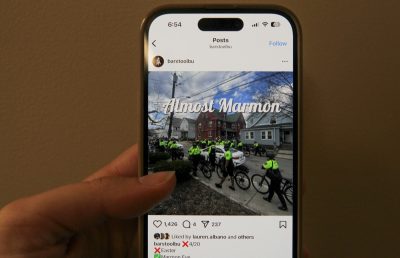Marathon Monday is not just a day off at Boston University — it’s a campus-defining ritual. While runners chase records down Beacon Street, students fill the streets of Allston, celebrating the city they call home.
Two Instagram accounts, @slackerbu and @barstoolbu are right at the forefront to capture every second of the festivities. Barstool BU’s “Almost MarMon” series, including images of the heightened police presence in Allston, and Slacker’s broken-hearted post about the closure of Gardner Court, offer a behind-the-scenes look at BU student life on Patriot’s Day.

The content doesn’t stop on the third Monday of April, though.
These two student accounts have built followings as they chronicle the BU student experience, becoming the unofficial storytellers of life as a Terrier.
JT Drozd, a senior at BU, is one of two administrators behind the Barstool BU account.
In January 2024, he saw a job posting on the account and applied, later accepting the role of one of two account administrators.
Seth Culberson, a BU sophomore, saw the same posting at a meeting for his professional fraternity and was also accepted.
The current Slacker BU admin, who asked to remain anonymous due to fear of doxxing, said she became the manager of the account after a friend passed it on to her before graduating and has since managed the account for three years.
While the two accounts both share a look into student life, they do it in completely different ways.
A focus of the Barstool BU account is BU Athletics, specifically men’s and women’s hockey.
“Making sure we have full coverage of [BU hockey], really promoting that to the student body is our biggest concern,” Culberson said, adding that they try to cover other big on-campus news.
Culberson said managing the account is “nice, because we’re not like a news site, per se,” taking a more satirical approach to content, but not without students’ interests in mind.
“It was definitely a concern for us,” he said. “How do we kind of address what our student body is looking for?”
For Slacker BU, much of the content comes from BU students themselves.
“I genuinely do enjoy hearing what’s going on with students,” the admin said. “A lot of the questions that I post, I want people to engage with them, and I want them to share their experiences.”
She added that one of her favorite things about running the account is interacting with students on a daily basis, unlike most other BU-based accounts.
The admin described Slacker BU as “a random BU student who enjoys making people laugh through memes and self-deprecating humor,” but she also wants the account to be a space where people can ask questions.
“I want to be able to give [the audience] advice and help, because a lot of times people do message the account and ask for relationship advice or course advice or housing advice,” she said.
But balancing running a multi-thousand-follower Instagram account can be a heavy burden in addition to academics, a job, research and personal life.
“You can tell when it’s finals season, because me and [Culberson], we post a lot less,” Drozd said. “It’s somewhere between an internship and a hobby now.”
However, Culberson sees running the Barstool account as more of a job.
“You have to stay with the times, you have to know what’s going on on campus,” he said. “You can’t just go off the grid, which I would like to do sometimes, especially over breaks in the summer, when you have to be digging up content.”
Slacker BU’s different content style makes posting more enjoyable, the account admin said.
“Because it doesn’t feel like work, and because I’m not paid to do it, it’s just something that, if I have a creative idea, I’ll make a meme about it,” she said.
The Slacker admin said she has noticed a change in her content as she changed during her time at BU.
The correlation between content and identity is part of a much bigger story of social media engagement — one that extends beyond Boston and is being recognized by BU faculty.
Professor Michael Dodge, a lecturer in the Department of Mass Communication, Advertising and Public Relations, has been teaching at BU since 2009 and has noticed the effects of social media on student life through the breaks he provides students with during longer classes.
“I can remember some of the early years when I was teaching, I would get nervous sometimes because it would get so loud in the classroom, the conversations, the interactions among students,” he said. “Now we get to that break … oftentimes no one leaves the room. It’s silence. Everyone just pulls up their phones and engages with their phones.”
Dodge said there are both positives and negatives to social media shaping student identity.
“Of course, there’s problematic things in terms of identity, the norms, the pressures,” he said. But he also noted that “there’s a great opportunity for community building.”
Drozd also spoke to how deeply social media shapes everyday student life.
“In a lot of ways, social media is student culture,” Drozd said. “You can’t be at every frat party, you can’t be at every game, you can’t be in every class. So a lot of culture you see on social media, if you want to adhere to that culture, you have to learn from social media.”













